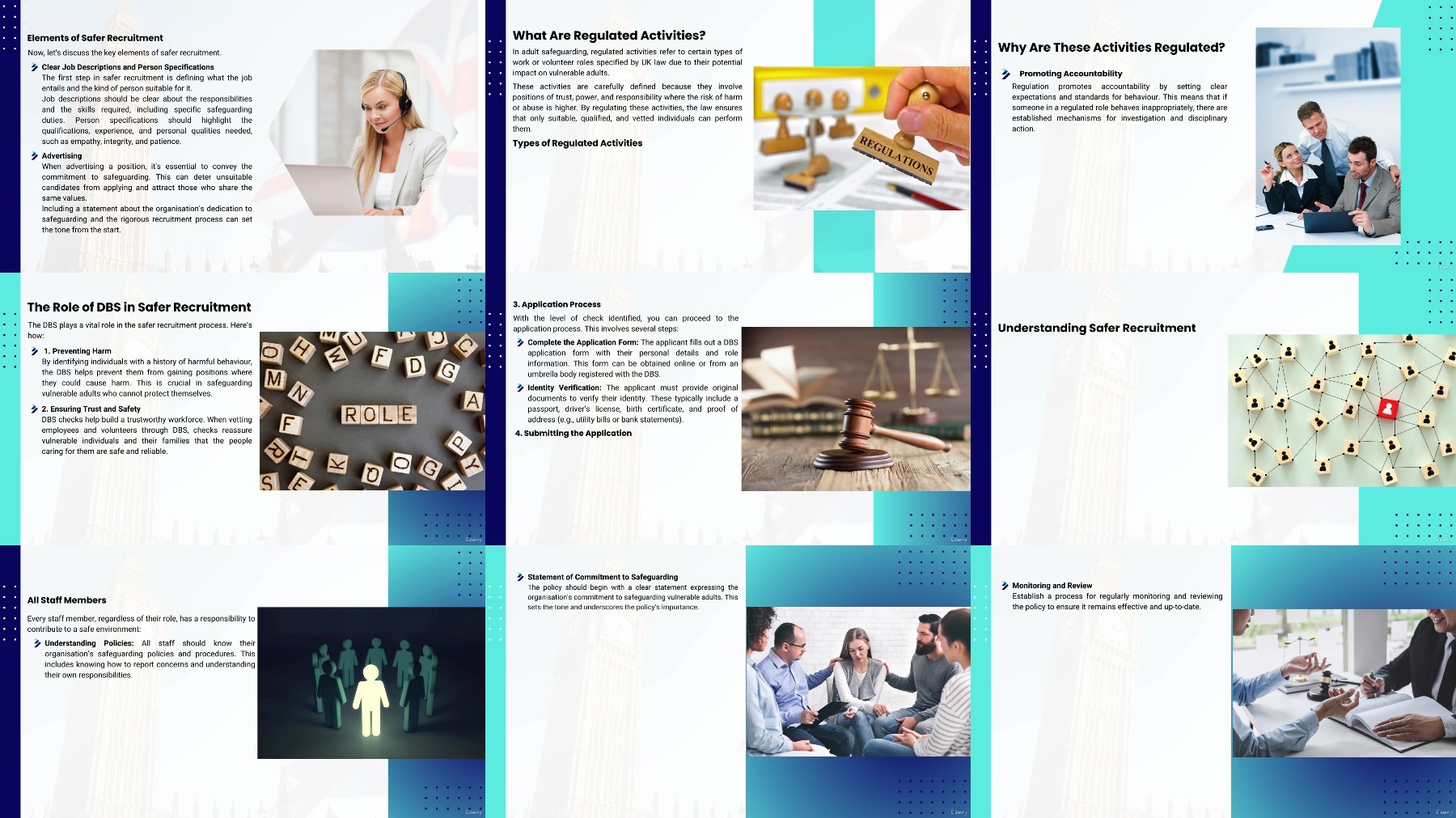Most Commented
Safeguarding Adults Level 3 Certification




Description material

Safeguarding Adults Level 3 Certification
Published 10/2024
MP4 | Video: h264, 1920x1080 | Audio: AAC, 44.1 KHz
Language: English | Size: 2.19 GB | Duration: 2h 58m
Safeguarding Adults: Advanced Training in Abuse Prevention, Risk Management, and Legal Compliance for Care Professionals
What you'll learn
Deepen your understanding of core safeguarding principles, learning to identify, report, and respond to instances of abuse, neglect, and harm in diverse health
Explore fundamental safeguarding legislation, regulatory frameworks, and policies designed to uphold legal and ethical standards in care settings.
Develop critical skills in risk assessment and informed decision-making, ensuring that the safety and welfare of vulnerable adults remain a top priority.
Gain knowledge on collaborative practices, working effectively with multiple agencies to provide comprehensive safeguarding support.
Build expertise in delivering person-centered care, prioritizing the dignity, rights, and autonomy of vulnerable adults.
Learn effective strategies for safeguarding, emphasizing respect and protection for individuals in vulnerable situations.
Requirements
No prior safeguarding experience is required; however, a background in health, social care, or related fields may be helpful.
An interest in learning about safeguarding adults and understanding how to prevent, recognize, and respond to abuse and neglect.
Access to a device with internet to complete online course modules and assessments.
Description
Are you ready to enhance your skills in protecting vulnerable adults in need? The Safeguarding Adults Level 3 Certification equips you with essential safeguarding knowledge, empowering you to identify, prevent, and address risks of harm and abuse effectively.The necessity of Safeguarding Adults is evidenced by rising cases of abuse and neglect among vulnerable adults in social and health care settings. Data shows that safeguarding practices significantly reduce the likelihood of abuse and promote respect and dignity. With proper training, you'll be prepared to address these critical needs and ensure compliance with legal and ethical safeguarding standards.At the start of this course, you will learn about the core concepts of Safeguarding Adults, including how to recognize various forms of abuse and harm. Additionally, you will explore vulnerabilities that may expose individuals to these risks. Further, we introduce restrictive practices and their ethical applications. By the end of this section, you will have foundational knowledge of the factors that contribute to abuse and neglect and how to recognize potential cases early on.Practices and Prevention in Safeguarding this section covers effective Safeguarding Adult practices, focusing on dignity, respect, and risk reduction strategies. You will learn how to seek information and guidance to strengthen your approach to safeguarding. Furthermore, it provides insight into the six principles of safeguarding, which are the cornerstones of ethical adult care. By completing this section, you will be able to apply these principles in real-world settings, thereby reducing the risk of abuse.Legal and Policy Frameworks in Safeguarding In this part, you'll delve into the laws and national policies that govern adult safeguarding. The focus is on understanding regulatory frameworks that dictate Safeguarding Adults practices, including how local systems work to prevent abuse. Additionally, you will gain insight into risk management techniques that prioritize preventative measures. After completing this, you will have a clear grasp of legal expectations and safeguarding obligations.Responding to Abuse and Ensuring Safe Practices here, you will learn essential steps for responding to suspected or reported cases of abuse, including complaint procedures and reporting channels. Additionally, this section highlights unsafe practices and how to avoid them to maintain a safe environment for Safeguarding Adults. By the end of this section, you will feel confident in handling suspected abuse cases and following protocol for thorough, ethical investigations.Multi-Agency Working and Safe Recruitment This final section emphasizes collaborative work in safeguarding through multi-agency cooperation and the importance of safe recruitment. You will learn how to respect consent and work with other agencies to support adult safeguarding effectively. After completing this section, you will be skilled in creating a cohesive safeguarding environment that incorporates multiple perspectives and areas of expertise.Why You Should Take This CourseGain essential skills for Safeguarding Adults, focusing on prevention and response.Learn about safeguarding laws and policies, ensuring compliance in all practices.Master risk assessment and multi-agency collaboration for comprehensive adult care.Develop expertise in person-centered care, upholding respect and dignity.Earn a recognized certification to validate your safeguarding knowledge.Career PathwaysAdult Safeguarding Officer – Lead safeguarding efforts in health and social care.Social Worker – Apply safeguarding practices to support vulnerable clients.Healthcare Professional – Integrate safeguarding into your daily patient care.Community Support Worker – Work directly with adults to ensure their protection.Care Manager – Oversee compliance with safeguarding standards in facilities.Enroll Now to Make a Difference in Safeguarding Adults!Take the next step in your career with the Safeguarding Adults Level 3 Certification and gain the skills needed to protect, respect, and care for vulnerable adults. Join today!Please Note: Care Skills Training is an Accredited CPD Member and a proud partner of The Royal Society for the Prevention of Accidents (RoSPA). Upon completing this course, you'll be eligible to receive a CPDQC-accredited certificate for a small additional fee. This prestigious certification will not only strengthen your resume but also enhance your prospects for career advancement and job opportunities.
Overview
Section 1: Introduction to Safeguarding Adults
Lecture 1 Overview of Adult Safeguarding Principles
Lecture 2 Recognizing Harm and Different Types of Abuse
Lecture 3 Understanding Vulnerabilities to Abuse
Section 2: Understanding Our CPD Accreditation
Lecture 4 How CPD Accreditation Enhances Your Learning and Career
Section 3: Practices and Prevention in Safeguarding
Lecture 5 Understanding Restrictive Practices and Their Impact
Lecture 6 Factors Contributing to Abuse and Neglect
Lecture 7 Upholding Dignity and Respect for Individuals
Section 4: Practice Test
Section 5: Guidance and Prevention Strategies
Lecture 8 Seeking Guidance and Resources in Safeguarding
Lecture 9 Reducing the Risk of Abuse: Key Strategies
Lecture 10 The Six Fundamental Principles of Safeguarding
Section 6: Legal Framework and Systems
Lecture 11 National Laws and Policies for Adult Protection
Lecture 12 Local Support Systems to Prevent Abuse
Lecture 13 Risk Management and Preventative Measures
Section 7: Responding to Abuse and Ensuring Safe Practices
Lecture 14 Complaint and Reporting Procedures
Lecture 15 Handling Suspected or Alleged Abuse Responsibly
Lecture 16 Identifying Unsafe Practices in Adult Care
Lecture 17 Safe Recruitment Practices for Safeguarding
Lecture 18 Collaborative Work and Respecting Consent
Section 8: Practice Test
Health and social care professionals who want to enhance their safeguarding knowledge and practices.,New or aspiring safeguarding officers or coordinators seeking a foundational understanding of safeguarding principles.,Anyone working with vulnerable adults, including those in nursing, caregiving, community support, or social work.,Individuals interested in a career in adult safeguarding or roles that require safeguarding awareness and compliance.,Professionals seeking certification to fulfill legal or organizational requirements for safeguarding training.

Fikper
https://fikper.com/MIW0YR2drg/.Safeguarding.Adults.Level.3.Certification.part1.rar.html
https://fikper.com/F1pW1Xri7P/.Safeguarding.Adults.Level.3.Certification.part2.rar.html
FileAxa
https://fileaxa.com/vmv8et9na3q4/.Safeguarding.Adults.Level.3.Certification.part1.rar
https://fileaxa.com/z8id1xjg8jmr/.Safeguarding.Adults.Level.3.Certification.part2.rar
RapidGator
https://rapidgator.net/file/644afd2204f74f8c1f958760a55ae4f3/.Safeguarding.Adults.Level.3.Certification.part1.rar
https://rapidgator.net/file/1ad986394405824e4106235d09a4c5ec/.Safeguarding.Adults.Level.3.Certification.part2.rar
FileStore
TurboBit
https://turbobit.net/1lrqznw8b9hz/.Safeguarding.Adults.Level.3.Certification.part1.rar.html
https://turbobit.net/ke1nn53pdxzl/.Safeguarding.Adults.Level.3.Certification.part2.rar.html
Join to our telegram Group
Information
Users of Guests are not allowed to comment this publication.
Users of Guests are not allowed to comment this publication.
Choose Site Language
Recommended news
Commented



![eM Client Pro 9.2.1735 Multilingual [Updated]](https://pikky.net/medium/wXgc.png)





![[PORTABLE] GiliSoft Audio Recorder Pro 11.3 Multilingual](https://i.postimg.cc/yNjQrFrD/Gili-Soft-Audio-Recorder.png)
![Movavi Video Editor 24.0.2.0 Multilingual [ Updated]](https://pikky.net/medium/qhrc.png)

